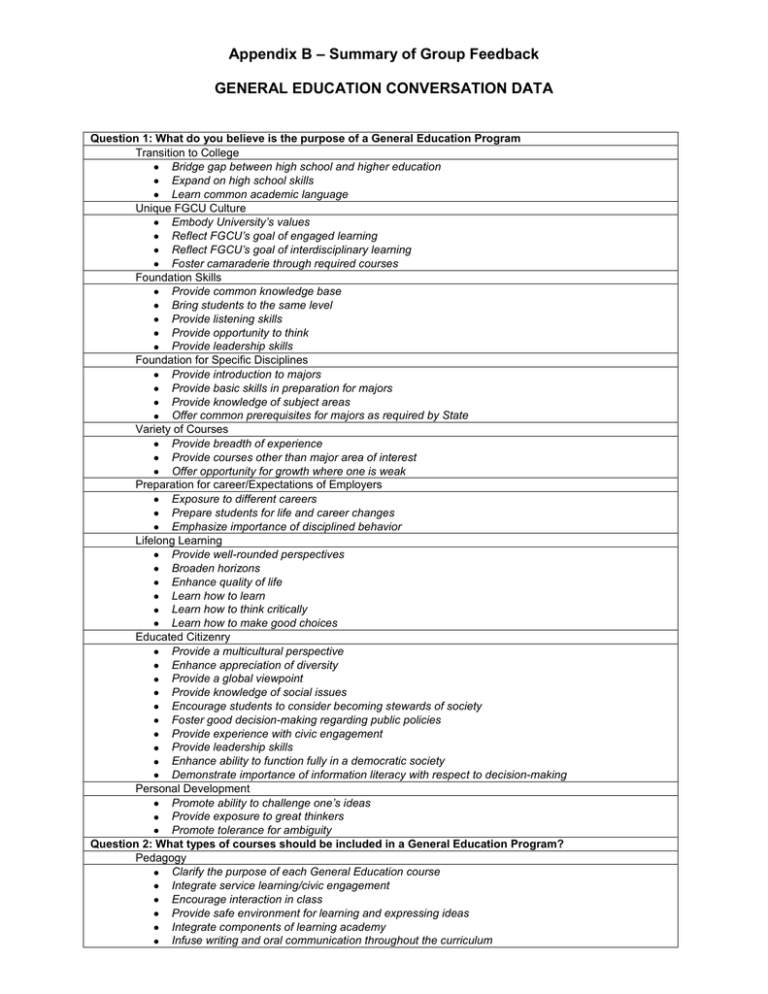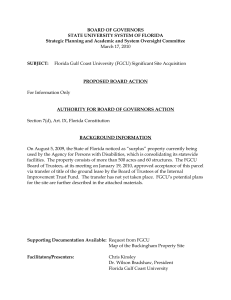Appendix B
advertisement

Appendix B – Summary of Group Feedback GENERAL EDUCATION CONVERSATION DATA Question 1: What do you believe is the purpose of a General Education Program Transition to College Bridge gap between high school and higher education Expand on high school skills Learn common academic language Unique FGCU Culture Embody University’s values Reflect FGCU’s goal of engaged learning Reflect FGCU’s goal of interdisciplinary learning Foster camaraderie through required courses Foundation Skills Provide common knowledge base Bring students to the same level Provide listening skills Provide opportunity to think Provide leadership skills Foundation for Specific Disciplines Provide introduction to majors Provide basic skills in preparation for majors Provide knowledge of subject areas Offer common prerequisites for majors as required by State Variety of Courses Provide breadth of experience Provide courses other than major area of interest Offer opportunity for growth where one is weak Preparation for career/Expectations of Employers Exposure to different careers Prepare students for life and career changes Emphasize importance of disciplined behavior Lifelong Learning Provide well-rounded perspectives Broaden horizons Enhance quality of life Learn how to learn Learn how to think critically Learn how to make good choices Educated Citizenry Provide a multicultural perspective Enhance appreciation of diversity Provide a global viewpoint Provide knowledge of social issues Encourage students to consider becoming stewards of society Foster good decision-making regarding public policies Provide experience with civic engagement Provide leadership skills Enhance ability to function fully in a democratic society Demonstrate importance of information literacy with respect to decision-making Personal Development Promote ability to challenge one’s ideas Provide exposure to great thinkers Promote tolerance for ambiguity Question 2: What types of courses should be included in a General Education Program? Pedagogy Clarify the purpose of each General Education course Integrate service learning/civic engagement Encourage interaction in class Provide safe environment for learning and expressing ideas Integrate components of learning academy Infuse writing and oral communication throughout the curriculum Integrate teaching of competencies throughout the curriculum Provide opportunity for students to work in groups Avoid providing courses that are strictly remedial Offer face-to-face rather than distance learning courses Avoid having faculty teach outside their discipline Provide faculty development opportunities Encourage dialog between General Education faculty and upper division faculty Structure of General Education Program Conform to requirements of the State of Florida Provide tiered level of courses Eliminate duplication with major courses Consider that fine tuning of FGCU’s General Education program may disadvantage transfer students Courses that Provide/Address Multicultural perspective Nature of different disciplines Diversity (in broadest sense) issues Introduction to majors Different points of view Values Prejudice and fears Connecting issues with ethics Promote good citizenship Social issues Knowledge of US government Foreign language studies Living in a democratic society Aesthetic appreciation (art, music) Working with others Environmental perspective/activism Contact with other students Understanding of current issues in science and technology Leadership development Science lab experience Dealing with conflict Practical application of mathematics Promoting good citizenship Knowledge of world geography Broad experience Interdisciplinary perspective Components of a learning academy Historical perspective Safe environment to learn, express ideas Courses that Teach Competencies FGCU General Education competencies (written and oral communication, quantitative reasoning, critical thinking) Listening skills Professional and technical writing Public speaking skills Basic computer skills Information literacy Library skills Lower tier research skills Reading and comprehension skills Independent Thinking Make decisions after considering alternatives Develop and defend one’s ideas and beliefs through cogent argument Develop deep critical thinking skills (philosophy) Personal Development Develop self-confidence Learn to balance life responsibilities Appreciate basic fitness (health and wellness) Question 3: Should the General Education Program prepare students for their majors? If so, how? Provide Basic Skills Set General Education competencies prepare students for majors Need to acquire basic competency skills to take full membership in the academy Prepare students to be ready to learn and think on their own Encourage independent learning Provide breadth of perspective Teach speech and listening skills Teach technology skills Teach information literacy skills Connection of General Education with Major Provide broad overview for preparation for any major, rather than for specific majors Keep General Education general – it is a discovery process Students with focus need a more structured course arrangement that lead to majors Explore taste for different disciplines Need good advising Need collaboration between General Education and major faculty Assistance with Career Choices Teach students to make a good living but also to live well Provide a career exploration course Infuse career information in courses Nature of General Education Program Need coherence among courses Too many courses reduce core learning Provide a balance between required and elective courses Eliminate distance learning courses in first two years since they diminish human interaction Relate writing assignments to students’ subject areas Provide civic engagement opportunities General Education is more than a curriculum - need contributions from advising, housing, student services Question 4: Should the General Education Program play a role in preparing students to be productive and responsible citizens? If so, how? FGCU Culture Developing responsible and engaged citizens is an FGCU goal, and therefore is also a General Education goal General Education should contribute to FGCU’s culture of civic engagement The University should be an agent for change – importance of developing community leaders who can make a difference Curriculum Develop a sense of community The curriculum provides a context that allows students to become involved in the community Developing responsible citizens should be inherent in the curriculum Teach students to be effective members of a group Incorporate local, national, and global issues in classes Weave ethics into General Education courses Importance of global communication/links to other universities Teach tolerance General Education program needs coherence – faculty should avoid concentrating only on their own areas of interest Civic Engagement General Education courses should be tied to service learning goals Acquaint students with values of service to the community Exposure to volunteerism is needed for students to become civic-minded after graduation Engagement with the external community brings awareness of the needs of the disadvantaged General Education should support the American Democracy Project Co-curriculum General Education exists beyond the classroom Student services has a role General Education as partner with faculty Travel is important in the learning process Student Government has an important role to play in General Education Courses Courses that help students become more informed and active voters are valuable Important to provide courses that present all sides of current civic issues and have service learning components Provide a course in how democracy works Skills/Behavior Provide skills needed to become engaged citizens and active voters Provide knowledge of how local government works Teach good citizenship skills Develop agents of change Learn how to learn Learn how to find information when needed Develop entrepreneurial skills Learn to adapt to change Learn to be productive and responsible Learn importance of civility Overcome inability to cope with not getting what you want Education vs. Indoctrination Education can’t force values –need to expose students to them Educate open-minded people who can use critical thinking skills to influence change Educate productive citizens rather than indoctrinate them Explore differences rather than “teach” tolerance and virtue Learn to articulate one’s values and defend them Train for a job, but educate for life Question 5: What do employers and other communities external to the university expect from a graduate of FGCU, and what is the role of General Education in meeting those expectations? Competencies Expected General Education competencies (written and oral communication, quantitative reasoning, critical thinking) Information literacy – knowledge of how to access, evaluate, and use information Listening skills Basic computer skills Creativity Leadership skills “Soft” skills preferable to technical skills, which can be more easily taught on the job Qualities Expected Common sense Ethical behavior Lifelong learner Alertness Well-rounded citizen Skepticism Team players Agent of change Comfortable when not in charge Collaboration Punctuality Practical social niceties Accountability Tolerance Trustworthiness Open-mindedness Respectfulness Flexibility and adaptability Interpersonal skills Ability to diffuse difficult situations (conflict management) Self-discipline Civil discourse Responsibility for actions Time management Self-starter/self-directed Willingness to improve Good work habits/work ethic Good comportment Reliability Cooperation Community/Diversity Able to communicate with people from different arenas/backgrounds Awareness of cultural differences Interact well with people in the community Respect for others General Education Culture General Education sets the tone for the entire campus The “hidden curriculum” is important – teaches integrity, respect, ethics FGCU is a microcosm of the employment world – it sets behavioral expectations The General Education program should have coherence and not be a checklist of courses General Education should require attendance and hold students responsible for their work


